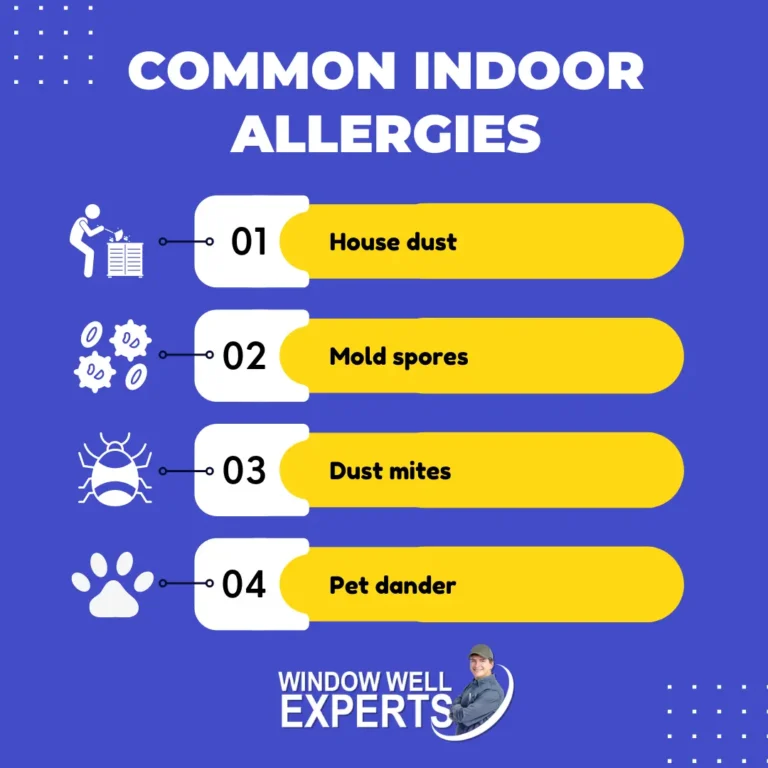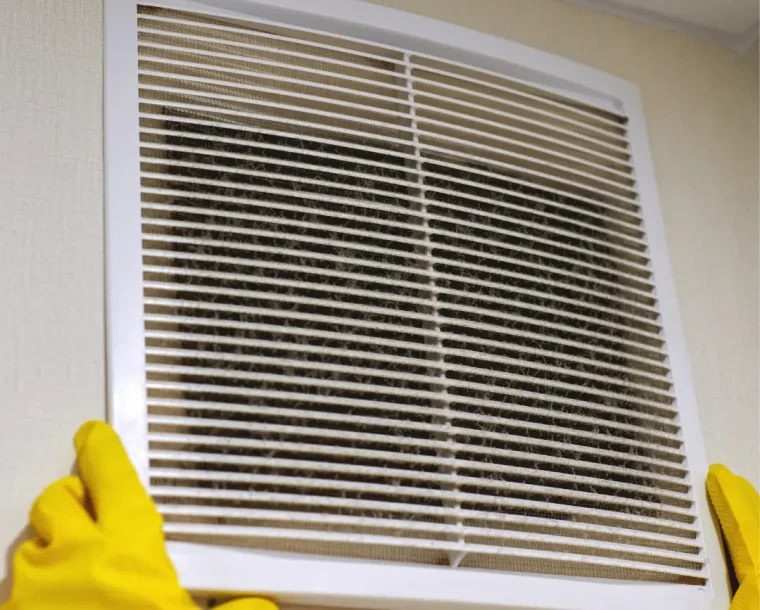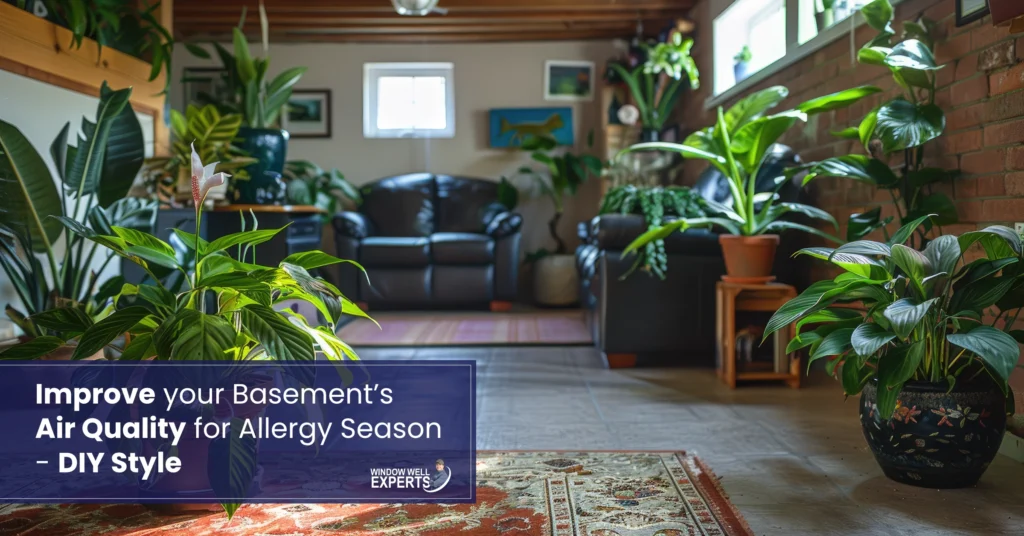As allergy season approaches, it’s crucial to address the air quality in the basement, a commonly overlooked area that can harbor a multitude of allergens and pollutants.
In this comprehensive guide, we’ll look at the importance of basement air quality and its impact on the occupant’s health, as well as practical DIY solutions for improving and maintaining clean air in the basement. From identifying sources of poor air quality to implementing cost-effective upgrades and natural remedies, you’ll discover a wealth of actionable tips to create a healthy environment for allergy season and throughout the year. Whether it’s combating mold and mildew, enhancing ventilation, or utilizing natural remedies, we’ve got you covered with expert advice and practical strategies to safeguard your family’s health and well-being.
Get ready to transform your basement into a clean, fresh, and allergy-friendly space with our DIY basement air quality improvement tips!
Understanding the Importance of Basement Air Quality

When it comes to the air quality in the home, the basement is often overlooked. Understanding and improving the quality of air in the basement is crucial for maintaining a healthy living environment.
Common allergens such as mold spores, dust, dust mites and pet dander tend to accumulate in basements due to the stagnant air, and higher humidity. By addressing these issues, a healthier space for the family is possible for a reasonable cost in most cases.
Poor air quality in the basement can have a significant impact on everyone’s health. It can make respiratory conditions such as asthma and allergies worse, leading to short term discomfort and potential long term health risks for children and those with compromised immune systems. Therefore, taking proactive steps to improve the air quality in the basement makes sense and is essential for maintaining overall well-being.
First do a simple visual inspection throughout the basement; looking for the obvious:
- Foundation cracks
- Plumbing leaks
- Mold or mildew on wall or floor surfaces
- Tell-tale dust streaks or accumulations
Another way to address this issue is by testing the quality of air in the basement using simple DIY methods, and expanding to using professional services if necessary. This will give valuable insight into contaminants present in the space and help to determine effective solutions. Whether through ventilation systems or other interventions, there are various methods available to enhance airflow and reduce pollutants.
Identifying Sources of Poor Air Quality in the Basement
- Mold and mildew growth is one of the biggest culprits when it comes to poor air quality in basements. The damp, dark environment often found in basements provides the perfect conditions for mold and mildew to thrive, releasing spores into the air that can cause allergic reactions and respiratory issues.
- Another common issue is poor ventilation and air circulation. Basements are often closed-off spaces with little airflow, allowing pollutants to build up without being properly filtered or removed. This stagnant air can be filled with dust, pet dander, and other allergens exacerbating allergy symptoms.
- Chemical off-gassing from building materials used in basement remodeling can also be a significant contributor to poor air quality. Products such as paints, adhesives, and carpeting can release volatile organic compounds (VOCs) into the air, causing irritation to the eyes, nose, throat, or even more severe health effects.
- Radon may be another issue that can impact the family’s health. Radon is a naturally occurring gas that is made from the natural decay of uranium. The highest occurrence in the US is in the upper Midwest. Home test kits, made by reputable labs, are as accurate as ones used by professionals and will determine if further action is needed.
DIY Solutions for Improving Basement Air Quality
Improving the air quality in your basement can be a satisfying project, especially during allergy season. One of the first steps is to ensure proper moisture control and waterproofing to prevent mold and mildew growth, as these can worsen air quality. By addressing any leaks in your plumbing, or water seepage around the basement windows and other openings in the foundation, and using sealants or coatings on walls and floors, you can create a drier and healthier environment.
Another DIY solution is to use air purifiers and dehumidifiers to filter out airborne particles like dust, pet dander, and pollen while reducing humidity levels. This not only improves the overall comfort of the space but also helps minimize allergens that could trigger symptoms during allergy season. Investing in portable or whole-house units can make a noticeable difference in the basement’s air quality. Changing and/or cleaning filters on a regular basis will keep the air throughout the home breathing easily.
When renovating or finishing your basement, consider choosing low-VOC paints and finishes for walls, floors, and furniture. These products emit fewer volatile organic compounds (VOCs), which are indoor air pollutants that can impact respiratory health. Opting for eco-friendly options will contribute to better indoor air quality while minimizing potential irritants.
Natural Remedies for Enhancing Basement Air Quality
Indoor plants not only add a touch of greenery to your basement, but they can also help improve air quality. Plants absorb carbon dioxide and release oxygen, which can help freshen up the air in this usually confined space. Some examples of great air-purifying plants include peace lilies, spider plants, snake plants, and pathos. These plants are easy to grow, needing medium light and once a week watering.
Another natural remedy for improving basement air quality is utilizing natural ventilation methods. Opening windows and doors to let fresh air flow through the space can help reduce stuffiness and remove stale odors. You can also consider installing window fans or using exhaust fans to increase airflow in the basement.
DIY air fresheners made from natural ingredients like baking soda, white vinegar, essential oils, or activated charcoal can be an effective way to combat musty smells in the basement. Additionally, placing bowls of white vinegar or coffee grounds around the area can help absorb unwanted odors and improve overall air quality.
Maintenance Tips for Sustaining Good Basement Air Quality
Regular cleaning and decluttering are essential for maintaining good air quality in your basement. Dust, mold, and other allergens can accumulate over time, so make sure to vacuum and dust regularly. Keep an eye out for any signs of water damage or leaks, as these can also contribute to poor air quality.
Inspecting your HVAC systems and filters is another important step in ensuring good basement air quality. Replace filters according to the manufacturer’s recommendations and schedule regular maintenance checks for your HVAC system. This will help ensure that the air circulating in your basement is clean and free of pollutants.
Preventing water intrusion and leaks is crucial for maintaining good basement air quality. Make sure to address any sources of moisture promptly, whether it’s a leaky pipe or poor drainage around the foundation. By keeping your basement dry, you can significantly reduce the risk of mold growth and improve overall air quality.
Professional Services for Basement Air Quality Improvement
When it comes to ensuring the air quality in your basement, professional services can make all the difference. Hiring a certified indoor air quality expert is a great way to get an accurate assessment of your basement’s air quality and receive recommendations on how to improve it. These experts have the knowledge and equipment to test for common allergens such as mold, dust mites, and pollen, allowing you to take proactive steps toward creating a healthier environment.
In addition, professional mold remediation services can help eliminate any existing mold growth in your basement. Mold can significantly impact air quality and exacerbate allergies, so addressing this issue is crucial for maintaining a clean and healthy space. By enlisting the help of experienced professionals, you can trust that mold will be effectively removed using industry-standard techniques.
Furthermore, consulting with basement waterproofing specialists is another important aspect of improving air quality. Waterproofing not only prevents moisture from seeping into your basement but also helps prevent mold growth and musty odors. With their expertise in sealing cracks, installing drainage systems, and applying protective coatings, these specialists can help create a dry and breathable environment that contributes to better overall air quality.

Conclusion
The impact of improved basement air quality goes beyond just breathing easier during allergy season. It contributes to an overall improvement in well-being by reducing stress on the body and allowing everyone to enjoy their time at home without worrying about indoor air pollution. Make the choice today to prioritize clean air for your family’s health.
At Window Well Experts, we pride ourselves on providing custom window well covers and accessories that are made in the USA. Our “Unbreakable” custom covers are designed to protect your home and family while adding a touch of style to any outdoor space.
Whether looking for a durable cover to keep out debris and pests or want to enhance the appearance of existing window wells, we have the perfect solution for any property owner. With our high-quality products and expert craftsmanship, over 40,000 clients have trusted us to protect and keep their window wells visually appealing.
If you’re looking to transform your basement into a productive hub, dive deeper into the topic with the article “From Basement to Office: Transforming Unused Space into a Productivity Hub“. Inside, you’ll discover step-by-step guidance on how to transform your basement, creating a fresh and inviting environment where you can spend quality time and feel at ease and do your best work.


